Best electric guitar strings 2025: Sets for all styles and budgets
These are the very best guitar strings from Ernie Ball, D’Addario, Elixir, Rotosound and more
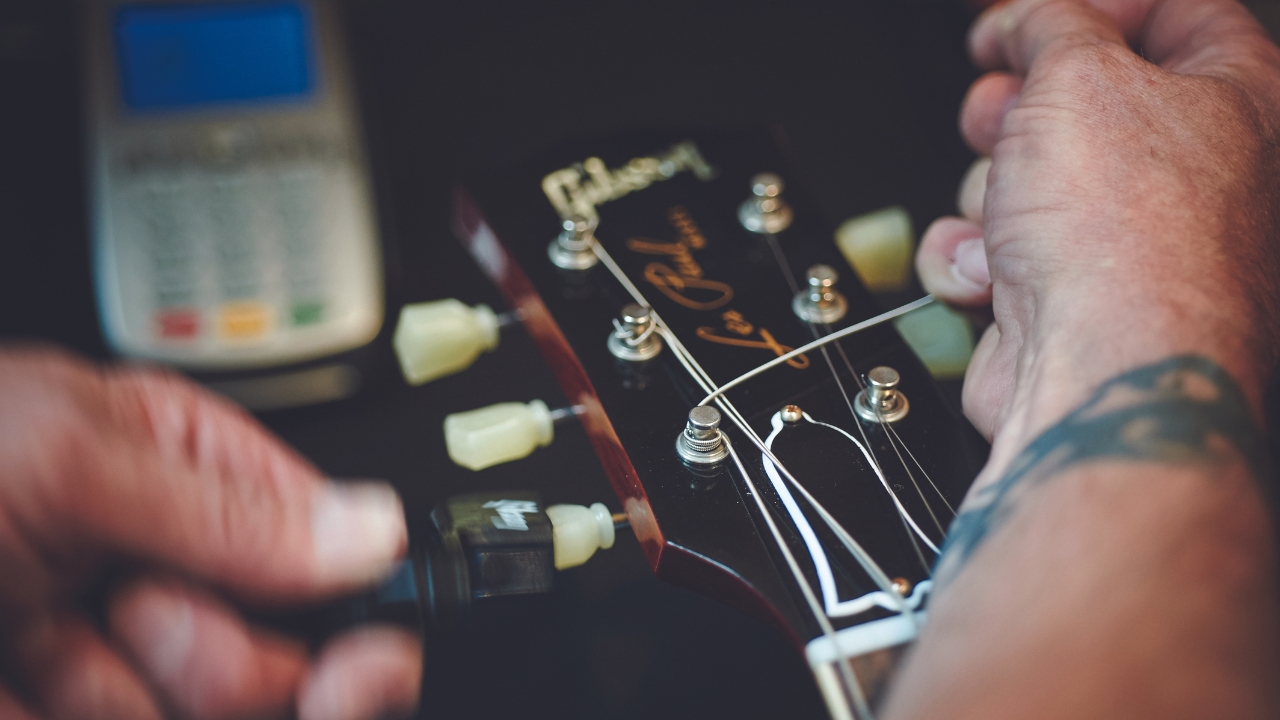
Picking a set of the best electric guitar strings should be easy, but with so many varieties out there it can be difficult to settle on your perfect match. As one of the crucial elements of your electric guitar tone, slapping the right set of strings on will not only have you playing better - but will make you sound better too. Electric guitar strings are similar, but not all created equal, so we've gathered the very cream of the crop in one place for you.
Despite being a relatively inexpensive piece of guitar gear, the type of electric guitar string you choose, and more importantly, the gauge you go for, will have a massive effect on the playability of your electric guitar. For this reason, we'd always recommend trying out a few different sets, as you'd be surprised how much of a difference a change of string gauge can make.
If you're buying for the first time, or you'd like to understand more before you make a change, go check out our buying advice section which features loads of common questions answered by the expert writing team here at MusicRadar. For those who already know their stuff, keep scrolling for the best electric guitar strings available today...
Best electric guitar strings: Product guide
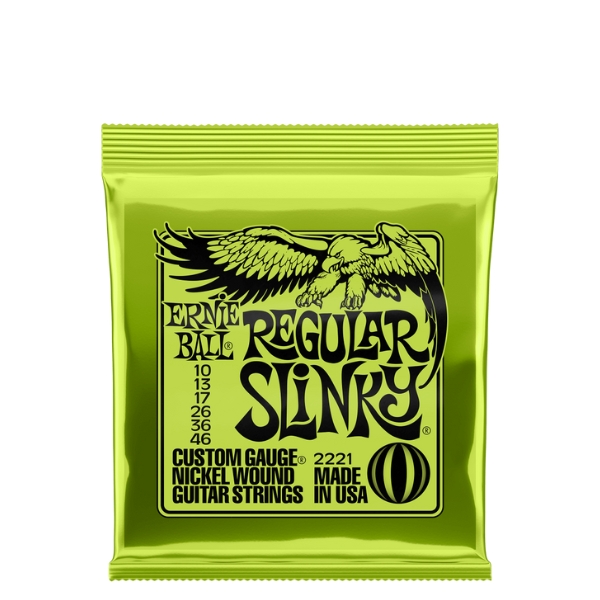
Material: Nickel/steel
Coating: N/A
+ Great value
+ Variety of gauges
- Not coated
There is a good reason for Ernie Ball's Slinky series of electric guitar strings' ubiquitous presence in gig bags and cases worldwide. Firstly, they sound great.
We've always found that they really pop with bright clarity and solid midrange, working on pretty much every guitar style. Secondly, they feel great. Bending strings is a breeze, and they aren't overly noisy.
The list of players that have used Slinkys is just a list of the greatest rock stars the world has ever seen. Everyone from Slash to Keith Richards, Angus to Hetfield has used Ernie Ball Slinkys to achieve their signature sounds.
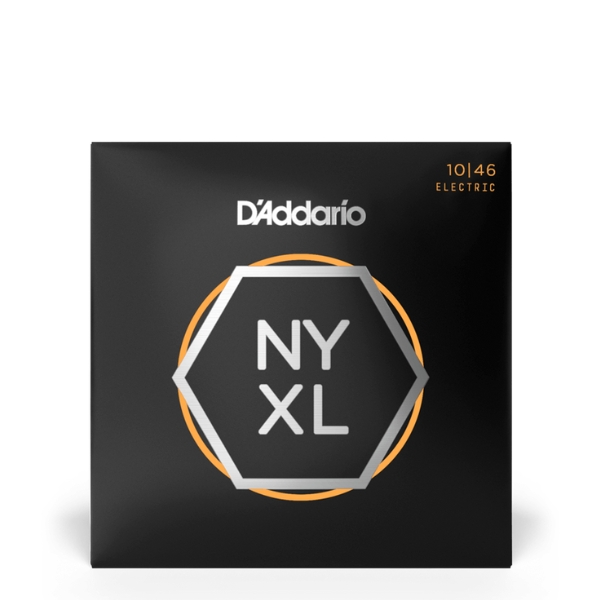
Material: Nickel/steel
Coating: N/A
+ Bright tone
+ Super tough
- Not coated
Claimed to be among the strongest electric guitar strings ever made, D’Addario’s technology offers a high-carbon steel core to resist breakage and refined frequency response to enhance presence and crunch.
D'Addario reckons they will "bend farther, sing louder, and stay in tune better than any string you’ve played before” and to be fair to D'Addario the NYXL set most definitely stood up to all kinds of abuse.
From gravity-defying bends to aggressive vibrato, these nickel-wrapped steel strings all while retaining their bright and articulate sound. They're excellent value for money and come in a wide variety of gauges.
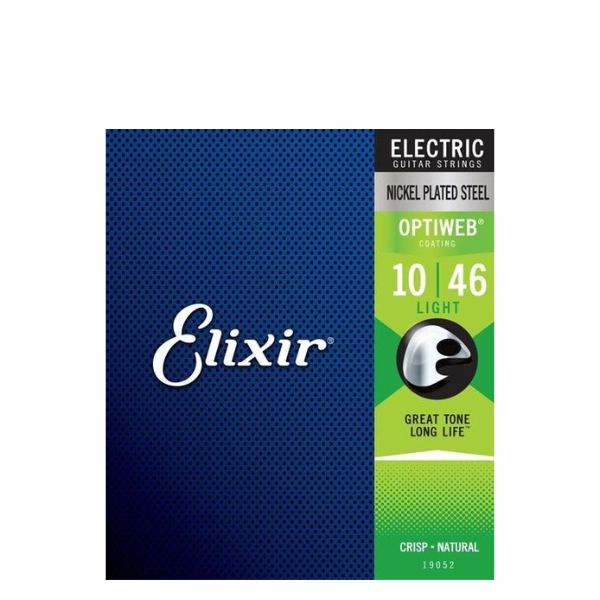
Material: Nickel/steel
Coating: Optiweb
+ Long lasting
+ Bright sound
- Coated feel
As a company at the forefront of the longer-life coated strings market when it was developed in the '90s, Elixir has continued to refine the technology. Optiweb is the company's latest coating, helping to protect these strings from corrosion
Sometimes, we find that coated strings can feel stiff and less responsive when compared to regular strings. But it's safe to say that that isn't the case with Optiweb. Instead, these strings feel highly flexible and, more importantly, playable!
While some coated strings can lack high-frequency response, the Elixir Optiweb still managed to remain bright and full of life when we tested them. Also unlike other brands, Elixir coats the whole of the string, too. Belt and braces.
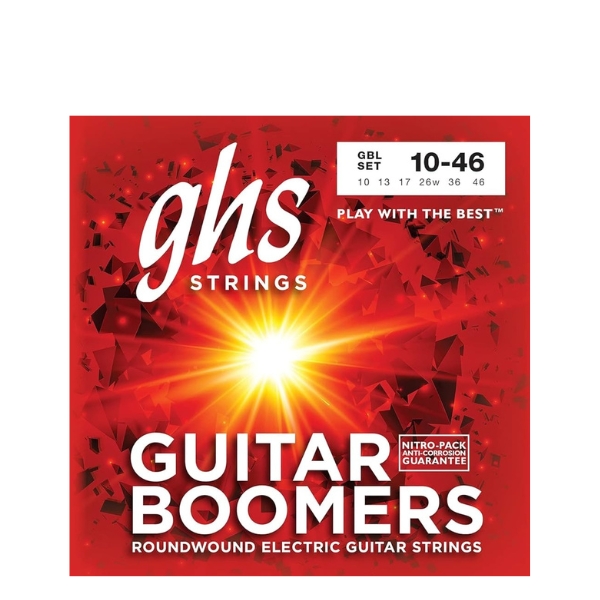
Material: Nickel/steel
Coating: N/A
+ Great value
+ Natural feel
- Plastic packaging
GHS Boomers have been in production since 1964 and are just as popular today as ever - and it's easy to see why. Readily available and discounted online, the GHS Boomers represent excellent value.
Boomers are uncoated, round-wound nickel-plated steel strings with a round core, and we find they offer a smooth ride for all kinds of styles. Those holding a note and bending it won't be disappointed.
We also feel the Boomers provide plenty of mid-range punch, which makes your guitar really sing. They come shipped in an air-tight fresh pack with each string individually wrapped in GHS's NitroPack.
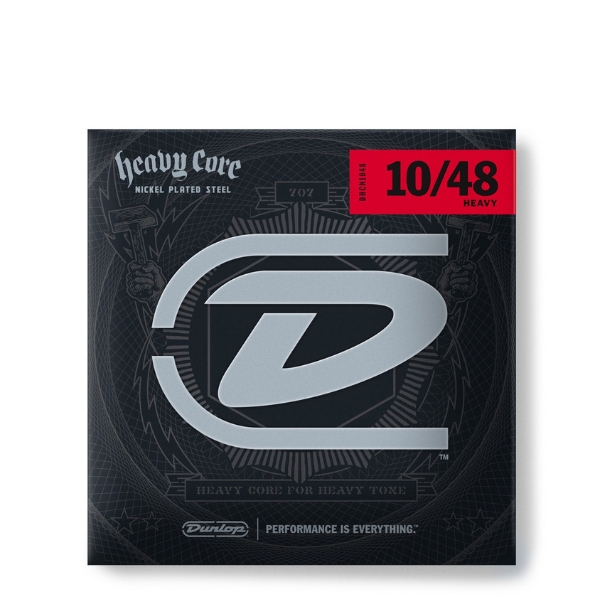
Material: Nickel/steel
Coating: N/A
+ Perfect for metal
+ Great response
- Too thick for some
Several brands now have sets catering for drop tunings, extended-range guitars, and even baritone guitars, but Dunlop says these Heavy Core nickel-wrapped steel strings have the core-to-wrap ratio to rule them all.
While not as popular as, say, Ernie Ball's Skinny Top Heavy Bottoms, we found the Heavy Core set to be comfortable and very consistent in tension at lower tunings. This meant we could really attack the strings without any of the flab of a regular set.
As you'd imagine, the Heavy Core line offers a myriad of gauges, from 10-60, 11-50, 12-54, and there's even a seven-string option! Whilst these are great for down-tuning metalheads, you probably won't want to put them on a 50s Strat.
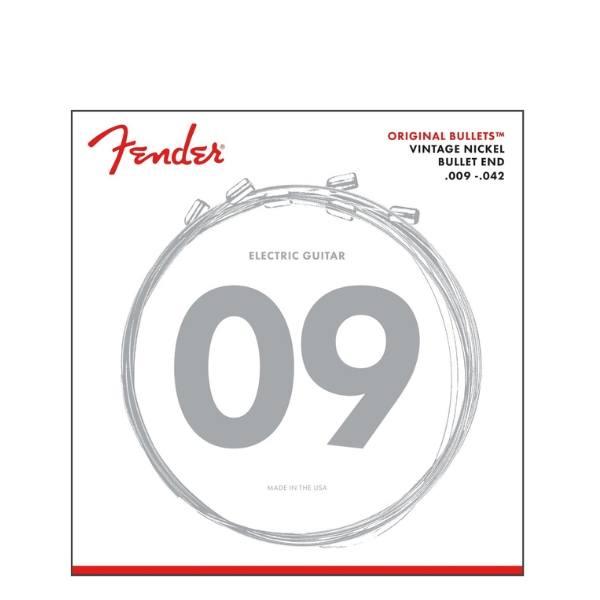
Material: Nickel
Coating: N/A
+ Vintage feel
+ Low squeak
- Not for high gain
Fender's Original Bullets take their name from the bullet-shaped string ends that sit snugly between the bridge block and create what Fender calls a “sonic coupling” which allegedly enhances stability and sustain.
One thing is for certain these strings are like a time machine thanks to the pure nickel construction. With nickel wrapped around a nickel core they make for a truly rich, warm tone, perfect for blues, country, and jazz.
Guitar strings are going two ways right now: one is looking forward to using cobalt, coating strings, and new tech, and the other is looking at offering players an authentic vintage experience. This is the latter.
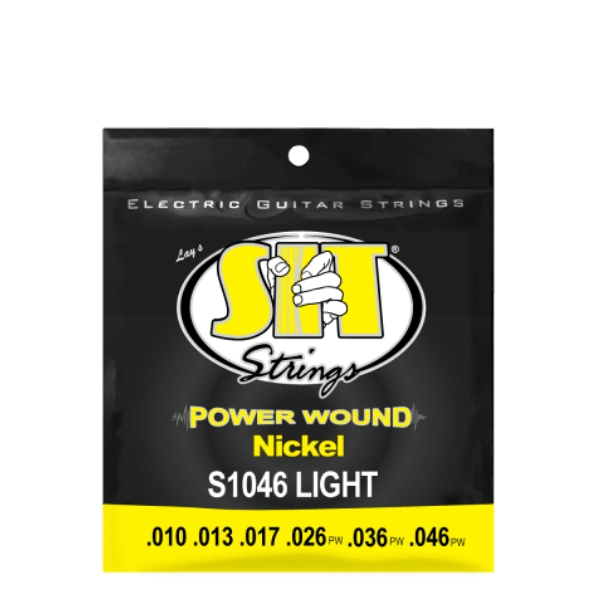
Material: Nickel/steel
Coating: N/A
+ Made in America
+ Durable build
- Limited availability
SIT is an all-American string company that prides itself on the fact that its strings Stay In Tune - get it? That's all down to their carefully considered construction that sees the strings manufactured in the US for top quality.
A combination of an 8% nickel-plated steel cover wrap over a hexagonal-shaped core - all sourced in the USA, no less - produces a bright treble response with a long-lasting string life and durable build.
That's made Power Wounds the strings of choice for power players such as The Black Keys' Dan Auerbach, Lamb Of God's Willie Adler, and Rammstein's Richard Kruspe. So you're in good company when you purchase a set of SITs.
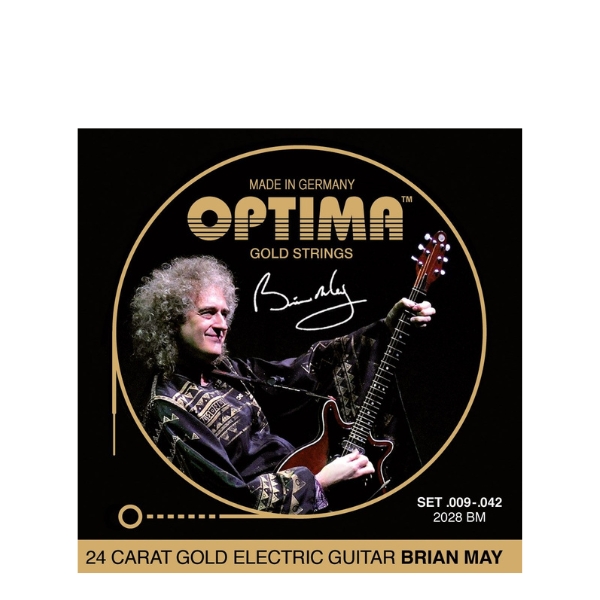
Material: 24-carat gold
Coating: N/A
+ Corrosion resistant
+ Easy to bend
- Expensive
Queen axe man Brian May is famous for his distinctive tone, and while a lot of that comes from his bespoke guitar and stack of Vox AC30 amps, a small portion of the tone has to come from his unique strings, right?
These long-life strings from German company Optima are the only 24-carat gold strings in the world - don’t fear, they’re priced in the upper-medium end of the spectrum. This round wound set is used by May exclusively, with a custom light gauge.
Expect to get a lot of joy from bends and a great feel from these gilded strings. Tone-wise, you are looking at a bright, harmonically dynamic voice. Is it too much to string your electric with gold strings? Hell no!
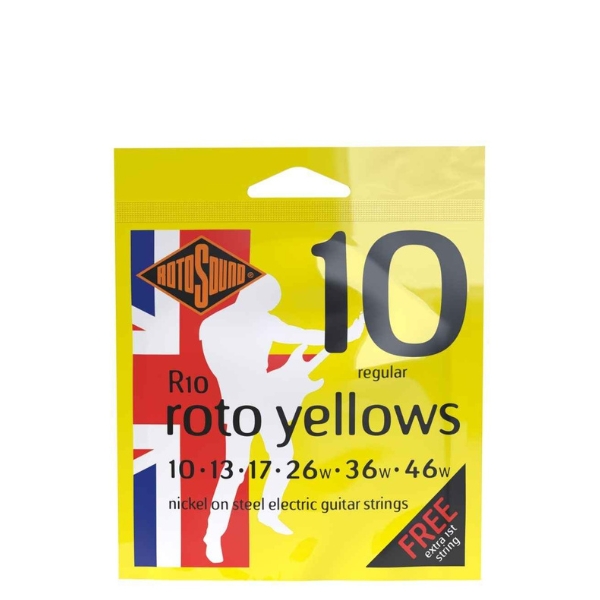
Material: Nickel/steel
Coating: N/A
+ Great value
+ Extra high 'E'
- Others last longer
The British string stalwart has been making strings since 1959 and now color-codes according to gauge as Roto Reds, Pinks, Yellows, and Purples, so no matter your guitar style, you'll find a set to match.
For us, Roto sound strings sound warm and smooth with a pleasant mid-range - a sound we particularly like on a Strat, and Jimi seemed to agree with us! As far as value for money goes, they're a brilliant option too.
The extra first string is a useful addition to these nickel-on-steel sets, especially for beginner players who are prone to snapping that high E when they first tune it up. It's also nice to know you have a spare knocking around if you need it.
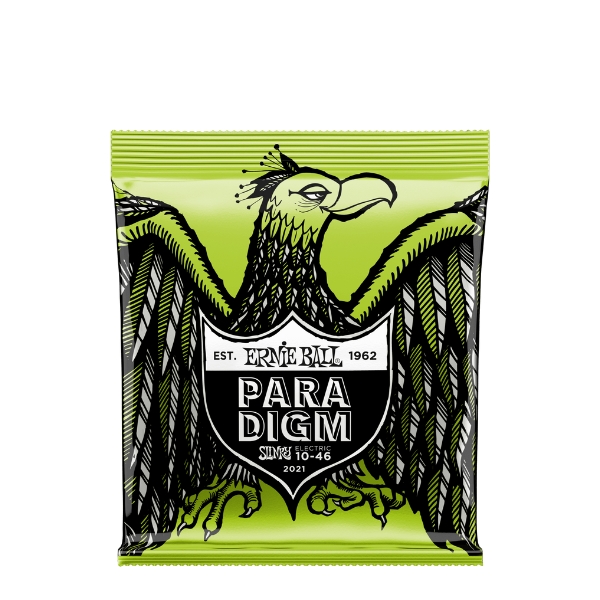
Material: Nickel/steel
Coating: Plasma
+ Super tough
+ 90-day guarantee
- Pretty pricey
String sage Ernie Ball reckons it’s made some of the world’s strongest strings with the Paradigm set - and we agree. The Paradigm strings promise longer string life while retaining the company’s iconic Slinky tone and feel.
Ultra-high strength steel can be found in the wound and plain strings, plus there is some reinforcement at the ball end - which in our tests helped them to lock in tune fast and hold up to aggressive styles without popping.
There’s also plasma-enhanced wrap wire for increased corrosion resistance, too, and Ernie Ball promises that its Everlast nanocoating won’t flake nor mess with the string’s natural response.
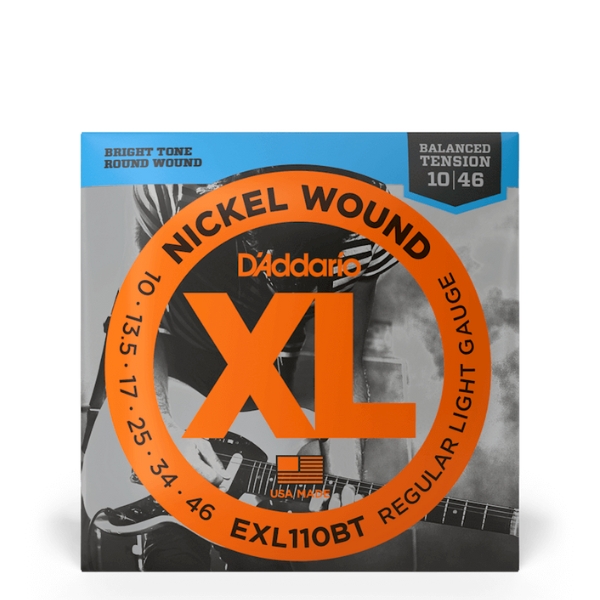
Material: Nickel/steel
Coating: N/A
+ Loads of gauges
+ Balanced feel
- Will feel strange at first
Traditional sets can sometimes feature vastly different tensions between strings, causing players to compensate with altered techniques. New York string icon D'Addario set out to even the playing field with its Balanced Tension XL sets.
Now, the Balanced Tension XL set manages to retain the classic sound of a D'Addario string while offering players a different feel - something we absolutely love. They boast mathematically equalized resistance for a similar feel from string to string.
We found the improved tension results in even effort when bending, strumming, plucking, and slapping, leading to enhanced dynamic control. It takes some getting used to, but it's worth the effort put in.
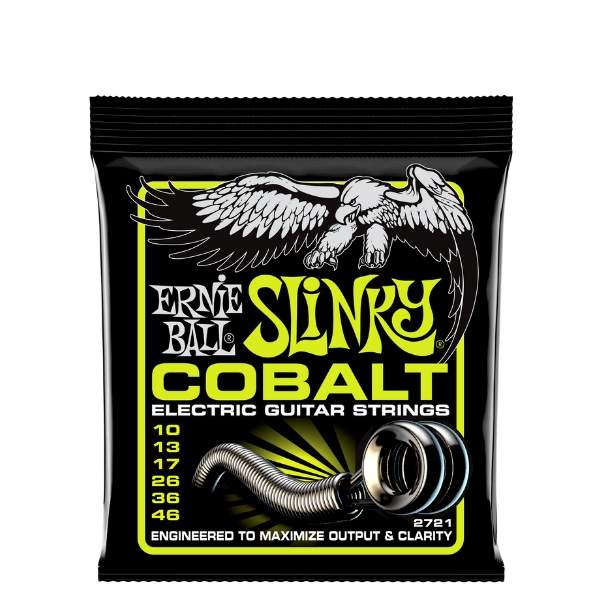
Material: Tin/steel
Coating: N/A
+ Enhanced output
+ Excellent clarity
- Output difference is small
The company's latest step in the Super Slinky catalog is the first cobalt string – a material said to provide a stronger magnetic relationship with pickups for higher output, clarity, and harmonic response.
You need to check out the Cobalt series if you are looking to get more volume out of your strings. We found that the Cobalts made our guitar come to life, enhancing the instrument's natural tone, and providing an extended output and clarity.
Now obviously, you get the same level of playability you've come to expect from the biggest name in guitar strings - so you don't need to sacrifice tone for feel. They're available in various gauges, so plenty of choices to suit your playing preference.
Best electric guitar strings: Buying advice
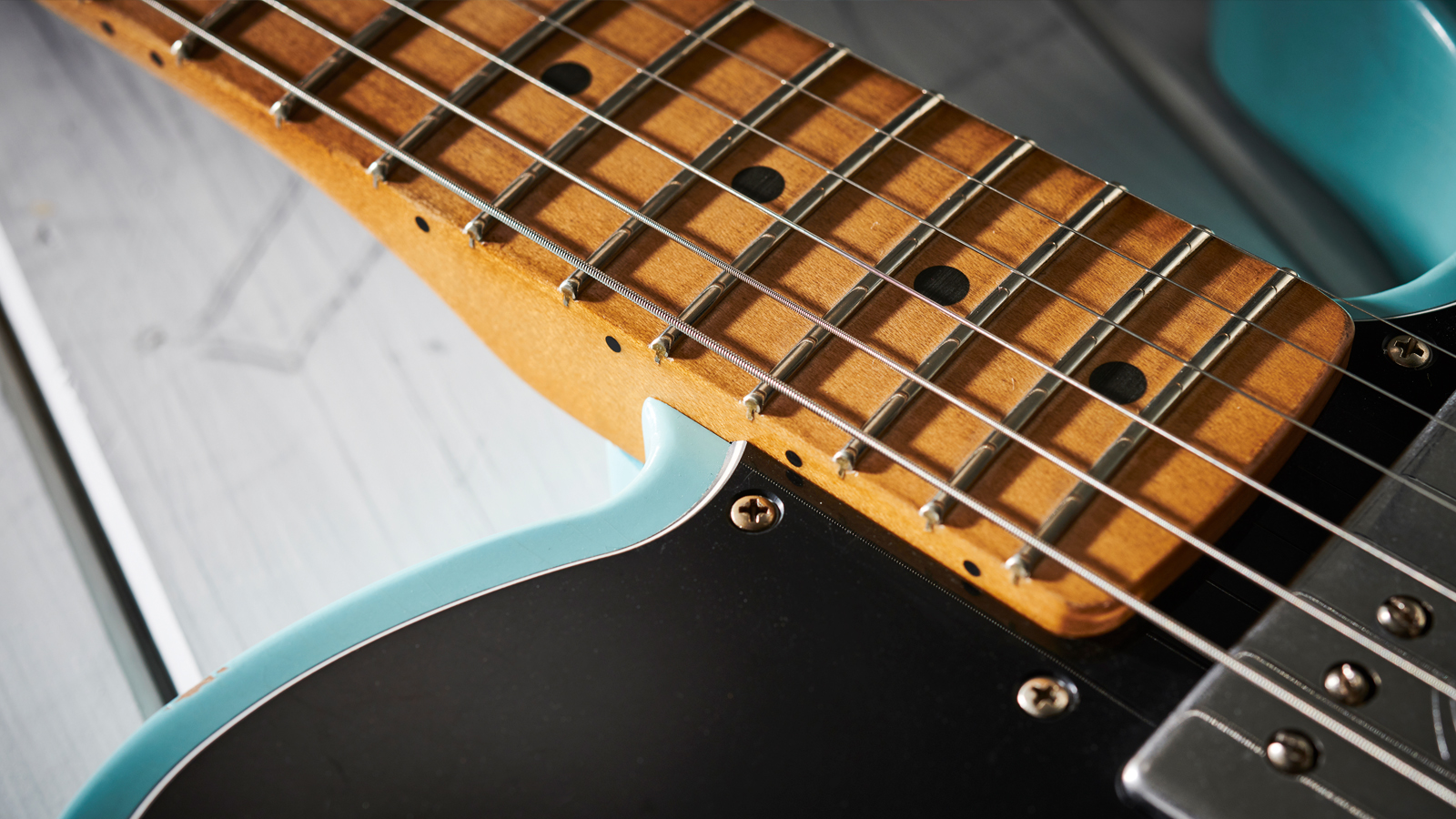
What gauge strings are best for electric guitar?
One of the most important things to consider when buying the best electric guitar strings for you is the gauge - the thickness - of the strings. Their thickness is measured in 1/000th of an inch and is usually referred to as 9’s, 10’s, 11’s - meaning that the thinnest string (your top E) is 0.009”, 0.010”, or 0.011, etc.
Thinner strings are easier to play, as the tension is low - making them easy to bend and softer on the fingers. The downside is that they are more prone to snapping, as there is less resistance against the force you put against them when playing.
Thicker strings are harder to break and they tend to yield a little more low-end tone, but you’ll find that they’re harder to bend. If you’re tuning down, as many metal players do, a heavier gauge set of strings will hold their tuning better, as the tension becomes more comparable to that of a lighter set in standard tuning.
You can also match the string gauge to your guitar’s scale length. It’s often said that thicker strings on a shorter-scale guitar, like a Fender Jaguar for example, feel better than lighter gauges as they add a little more tension. Ultimately though, it’s usually a case of trial and error and discovering what feels comfortable for you and your setup.
What type of strings are best for electric guitar?
Luckily guitar strings are not expensive. This will be one of the cheapest parts of your rig – so experimenting with as many different sets as you can is a good idea. Your ears and fingers do the rest - listen to them, and they'll tell you which strings are right for your particular style and feel.
There are other considerations, however, like tuning stability and durability. No string is fully break-proof, but you should be looking for those with high tensile strength.
Coated or uncoated electric guitar strings? A word on guitar string materials…
Coated strings such as Elixir’s promise to extend the life of your string, repelling the gunk and sweat that builds up when playing. While some players prefer the natural feel of an uncoated string, not to mention the lower price, string coatings have evolved to feel evermore natural. They will still feel a little bit different, but they will also stay brighter longer.
That said, the resurgence in popularity of pure nickel strings suggests that players still value that vintage experience, and in terms of warm tone and smooth playability, they are hard to beat.
The most common spec for the electric guitar string is nickel-wound steel, which offers a little of the warmth of nickel but with a brighter top end. If this doesn’t sound quite your thing, there is, naturally, a 24-carat gold option from Optima.

When should I restring my electric guitar?
There are no hard and fast rules over when you should change your electric guitar strings, to be honest. Most casual guitarists do it once every two or three months, but if you’re a more serious player who’s putting in a few hours of practice every day and gigging regularly, you’ll probably need to change them more often.
It also depends on how you want your strings to sound. If you want them to sound at their absolute best for a recording session or tour, then you might want to replace them every few days. Electric guitar strings have a small window where they sound their very best, so it’s a good idea to make the most of that.
Can I put electric guitar strings on my acoustic guitar?
Technically yes, but surely you could buy a set of the best acoustic guitar strings instead?
Theoretically, electric strings will work on an acoustic guitar. They are, however, made of different materials specifically so they can work the best on their designated instrument. Acoustic strings are usually bronze or brass, and electric strings are nickel or steel. These are quite different types of construction - so using electric strings on an acoustic won’t be optimal.
Which electric guitar strings are best for beginners?
If you’re a beginner, you’ll want to start off with a lighter gauge of electric guitar strings. The lighter the gauge of string, the less tension it produces - and that makes it much easier to play. We’d recommend a set of .009 to .042 gauge strings - as we feel that this is a great middle-ground to start on. You can go lighter, but the tone will be compromised - or you can go heavier, but playability will suffer.
It’s all about experimenting with strings at the end of the day though - luckily they’re affordable and easy to change, so you can try a few different types to see what you like the most.
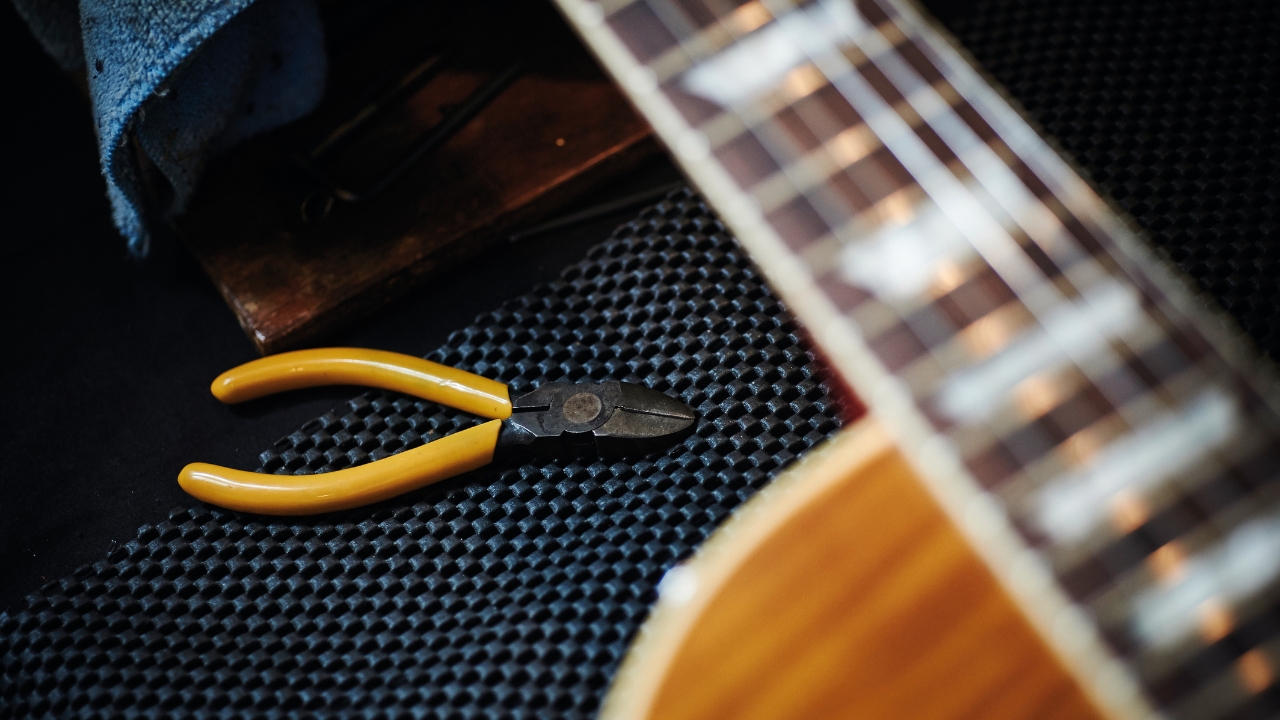
What are the best electric guitar strings for heavy sound?
The most important thing to note when answering this question is that there are a lot more components that go towards creating a ‘heavy’ sound than just your strings. Of course, thicker strings let you down-tune your instrument, which makes it sound heavier but there’s no reason you can’t get a heavier sound with thinner strings too.
The New Wave of British Heavy Metal bands all typically used standard gauge strings and played in standard tuning or half a step down - no one’s gonna argue that Tonny Iommi didn’t sound heavy on a set of 8s!
So whilst thicker strings are great if you’re playing in lower tunings, there’s a lot more to it than just string gauge. It’s more about your playing technique, how locked in you are with the rest of the band, your electric guitar pickups, as well as your pedals and amplifier settings that determine whether you sound ‘heavy’ or not.
How we test the best electric guitar strings
When testing electric guitar strings, we want every set to meet a certain set of criteria before we recommend them to you. They need to be up to the task, first of all, they need to make playing easy, and they need to make your guitar sound good.
In order to check whether a set of strings is up to the task, we'll first string up our electric guitar with a set and see how long they take to settle in. This process is about your strings reaching a stable tuning, after which you won't need to mess with them too much. A good set of strings will reach this point in minutes.
Making playing easy is all about how the strings feel. Now, 'ease' of playing often comes down to the gauge of string - something which is entirely subjective - but we want to make sure that the strings feel smooth, and are without imperfections. If the strings are coated, we don't necessarily want to feel the coating - but if we can see and feel the result of the anti-corrosion technology? That's ideal. Speaking of corrosion, we'll test to see how long it takes for the strings to go dull, too.
To test how they sound, we'll play music of all different styles. We'll note what type of difference they've made to the sound of our guitar, too.
Read more about how we test music making gear and services at MusicRadar.
Related buyer's guide
MusicRadar's got your back
- Get in tune with the best guitar tuners money can buy
- Best guitar strings: a beginner’s guide
- Freshen up your uke with the best ukulele strings
- Freshen up your low end with the best bass strings available today
- Best nylon guitar strings: top sets for classical, hybrid and flamenco players
Want all the hottest music and gear news, reviews, deals, features and more, direct to your inbox? Sign up here.
Jonathan Horsley has been writing about guitars and guitar culture since 2005, playing them since 1990, and regularly contributes to MusicRadar, Total Guitar and Guitar World. He uses Jazz III nylon picks, 10s during the week, 9s at the weekend, and shamefully still struggles with rhythm figure one of Van Halen’s Panama.
- Matt McCrackenJunior Deals Writer
